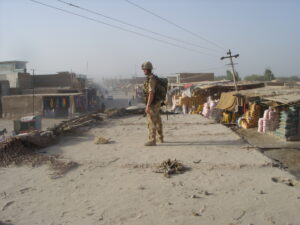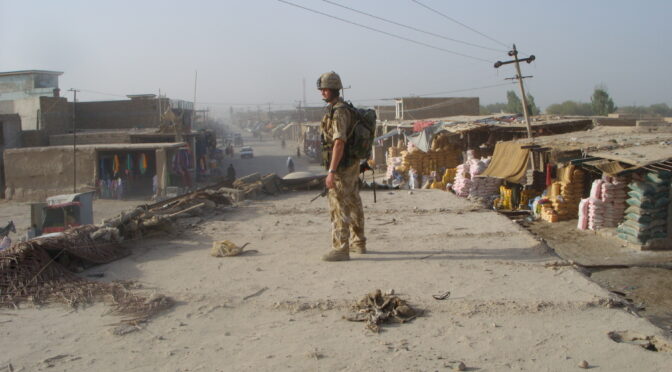Article published in The Sunday Express, 18 January 2015. © Richard Kemp
As British and American forces were moving out of Afghanistan last autumn, clear signs were already emerging that the Islamic State were planning to move in. Despite the warnings from Iraq and Syria this had no effect on NATO withdrawal plans, leaving a security vacuum that now threatens a full-scale re-run of the jihadist onslaught in the Middle East.

In recent weeks we have seen increasing evidence that the Islamic State’s Khorasan group, encompassing both Pakistan and Afghanistan, is building a dangerous presence there. Circumstances in Afghanistan and Pakistan are different to Iraq and Syria where isolated and fractured security forces were unable to prevent rapid gains by the Islamic State.
But the governments of Afghanistan and Pakistan face huge security challenges and, though not as weak as their Middle East counterparts, also lack capability. It would be naïve in the extreme to assume the Islamic State could not extend its brutal tyranny into vast swathes of territory in both countries.
In Pakistan, the Taliban and Al Qaida are in disarray. The Pakistan Taliban are fractured by tribal infighting and increased pressure from government forces. Following the devastating US drone campaign in the Pakistan border areas, Al Qaida has been decimated and substantially defeated.
Despite setbacks resulting from US-led Coalition attacks, the Islamic State remains rampantly successful. As in every sphere of life, jihadist success attracts rising support and thousands in Pakistan have been recruited to the black flag.
Six senior Pakistan Taliban leaders have publicly sworn allegiance to Abu Bakr Al Baghdadi. Several Pakistan-based jihadist groups have declared their alliance with the Islamic State, including Jundullah, formerly allied with the Pakistan Taliban, and the devastatingly effective Islamic Movement of Uzbekistan, an Al Qaida franchise. We can expect to see further groups following suit.
The Islamic State will now be working to develop an already well-established relationship with the core elements of the Pakistan Taliban, which sent at least 1,000 of their men to Syria to fight under Al Baghdadi. The Pakistan Taliban operate on either side of the border, and riding on their back, Khorasan could rapidly generate a severe threat to both countries.
The US and UK might have failed to appreciate the opportunities for jihad of our precipitate withdrawal from Afghanistan but the Islamic State have not. Exploiting our legacy of inadequate government control they will work to recruit the many thousands of experienced, armed, equipped and willing Afghan jihadists to feed a strategy of seizing and holding territory.
The flexible allegiance of Afghan fighters is legendary. Many are available, sometimes with large arsenals and cohorts of followers, to the highest bidder, whether Taliban, Al Qaida, warlords, drug barons, Russians, British or indeed Khorasan.
Others will succumb to violent assault or demonstrations of the extreme brutality that is the trade-mark of Al Baghdadi’s men. Still others will be attracted to the Islamic State’s winning brand and enticing recruitment programme.
The absence of top-level Taliban leaders, with Mullah Omar in hiding, undermines loyalty. Some hard-liners will defect to Khorasan if there is any rapprochement with the Kabul government or local deals with provincial authorities as is being encouraged by President Ashraf Ghani’s new administration as well as the US and the UK.
But the Islamic State also faces harsh resistance from much of the Afghan Taliban, Al Qaida, local tribes and warlords. Many will react to any encroachment with the vicious barbarity the Islamic State reserve for their own enemies. In general the Afghan Taliban share neither the transnational aspirations of the Islamic State, nor its fixation on eradicating Shia Muslims as well as Western infidels.
We have seen clashes in the southern Afghan provinces already, including in Helmand where Mullah Abdul Rauf has formed an Islamic State group. A senior Taliban leader, Rauf was captured by the Americans and detained in Guantanamo Bay but, as with an increasing number of his fellow terrorists, was later released to fight another day. His base is in Kajaki, an area once occupied by British forces but now outside government control. There are reports that Rauf’s group has expanded its presence into the town of Sangin to the south, where so many British soldiers died fighting the Taliban.
Of course the Islamic State is not invincible – unless we allow them to be. Western nations should do everything in their power to prevent them from gaining traction in Afghanistan or Pakistan. Territory under Khorasan control would be used for attacks against the West. The inflow of jihadists from Western nations and their return home, battle-hardened, would exacerbate the spiraling nightmare that has led to terrorist plots in France and Belgium in recent days.
Support should be given to the Afghan and Pakistan governments in their fight against jihadist expansion. Diplomatic efforts must be made to encourage the cross-border cooperation that has been lacking for the last decade yet is vital to dealing with the threat in both countries. Afghan, Pakistani and Western intelligence agencies should set Taliban, Al Qaida and Khorasan against each other with the aim of mutual destruction.
As a minimum, British and American forces should maintain intelligence networks in Afghanistan and the ability to conduct air strikes and special forces raids against the Islamic State as well as Al Qaida and the Taliban.
We must not repeat in Afghanistan the grave mistake of 2011, when US and British forces completely abandoned Iraq, opening the way to the Islamic State’s conquests.

